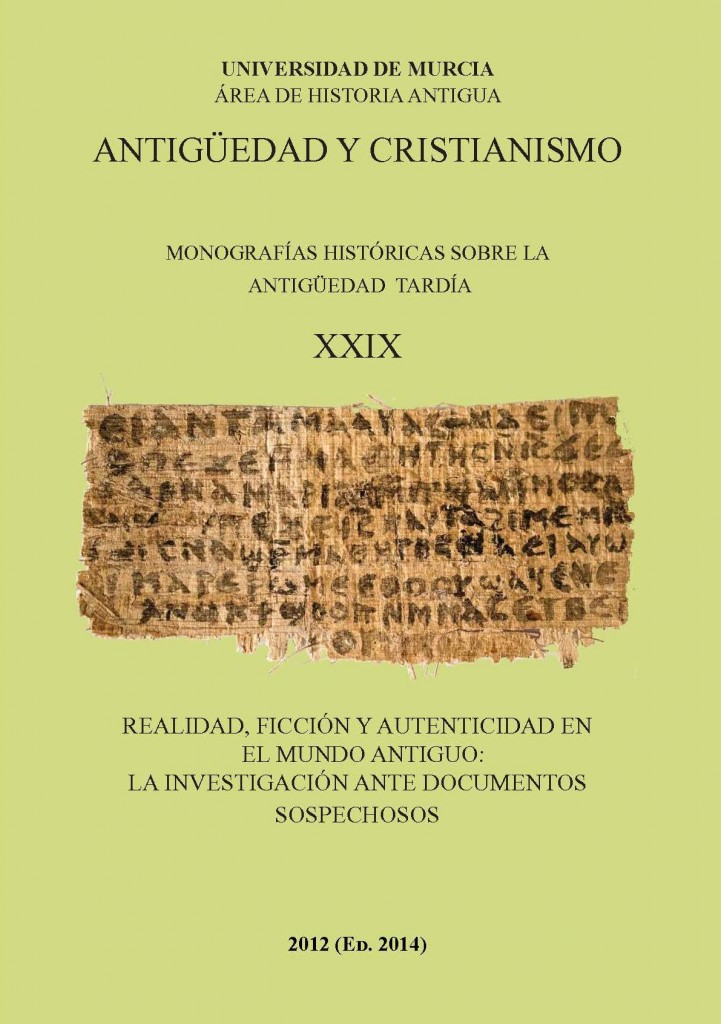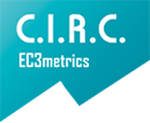The elegy Amores III 5: possible indication of Ovid's perfectionism
Abstract
For a long time there have been authors who have been discussing whether the Amores 3.5 elegy was composed by Ovid or not, but it continues to be edited as if it were authentic. On the other hand, other texts with similar problems have been eliminated because editors consider them spurious and there is no established protocol followed by all philologists. In this work, the circumstances surrounding Ovid's work and this elegy are analyzed and it is noted that for the moment it is difficult to reach a definitive conclusion about its authorship, but it could be an indication of the poet's perfectionism.
Downloads
-
Abstract272
-
PDF (Español (España))123
References
A. GUDEMAN, “Literary Frauds among the Romans”, TAPhA 25, 1894, pp.140–164
A. GUZMÁN GUERRA, “Pseudo-literatura, falsifi cación y canon: una perspectiva programática” en A. Alvar (coord.), Actas del XI Congreso de la Sociedad española de Estudios Clásicos, vol. II, Madrid, 2005, pp. 177–216
A. GUZMÁN GUERRA, “Pseudo-literatura, falsifi cación y canon: una perspectiva programática” en A. Alvar (coord.), Actas del XI Congreso de la Sociedad española de Estudios Clásicos, vol. II, Madrid, 2005, pp. 177–216
A. RAMÍREZ DE VERGER, “La carta de Safo a Faón de Ovidio (Her. XV)”, Emerita, 77,2, 2009, pp. 187–222
A. RAMÍREZ DE VERGER, Ovidio. Obra amatoria I: Amores, Madrid, CSIC, 1991
A. RAMÍREZ DE VERGER, Ovidio. Obra amatoria I: Amores, Madrid, CSIC, 1991, pp. XXXVIII-LII
A. RONCONI, “Introduzione alla letteratura pseudoepigrafa”, en Filologia e lingüística, Roma, Ateneo, 1968, pp. 233–263, en p. 233
A. RUIZ DE ELVIRA, “Sic vos non vobis”, CFC (lat) 22, 1989, pp. 33–38
C. MARTÍN PUENTE, “La literatura latina de autoría dudosa. Los textos literarios latinos frente a la Historia de la Literatura Latina”, en J. Martínez (ed.), Fakes and Forgers of Classical Literature. Falsificaciones y falsarios de la Literatura Clásica, Madrid, Ediciones Clásicas, pp. 197–216.
C. MARTÍN PUENTE, “Tratamiento de las obras anónimas y de dudosa autoría en la Filología Latina, en J. Martínez (ed.), Mundus vult decipi. Estudios interdisciplinares sobre falsificación textual y literaria, Madrid, Ediciones Clásicas, 2012, pp. 213–226
CH.E. MURGIA, “The Date of the Helen Episode”, Harvard Studies in Classical Philology, 101, 2003, pp. 405–426
E. J. KENNEY, “The Manuscript Tradition of Ovid’s Amores, Ars Amatoria, and Remedia Amoris”, CQ n.s. 12, 1962, pp. 1–31
E. J. KENNEY, “The Manuscript Tradition of Ovid’s Amores, Ars Amatoria, and Remedia Amoris”, CQ n.s. 12, 1962, pp. 13
E.H. CLIFT, Latin pseudepigrapha: a study in literary attributions, Baltimore, J. H. Furst Company, 1945, p. 1
E.J. KENNEY, “On the Somnium attibuted to Ovid”, Agon 3, 1969, pp. 1–14
E.J. KENNEY, “Two disputed passages in the Heroides”, CQ 29, 1979, pp. 394–431
F. BERTINI, “La Ringkomposition negli Amores ovidiani e l’autenticità dell’elegia III 5”, RCCM 16, 1976, pp. 151–160
F. DELLA CORTE, “L’elegia del sogno (Ovid. Am. III 5”, en Studi Classici in onore di Q. Cataudella, vol. III, Catania, 1972, pp. 319–330 (Opuscula IV, Genova 1973, 17–28)
F. TRONCARELLI, “L’attribuzione, il plagio, el falso”, en Lo Spazio Letterario del Medioevo, 1,1,1, Roma, 1993, pp. 373–390.
F. TRONCARELLI, “L’attribuzione, il plagio, el falso”, en Lo Spazio Letterario del Medioevo, 1,1,1, Roma, 1993, pp. 373–390
F.W. LENZ, “Das pseudo-ovidische Gedicht De sompnio”, MLatjb 5, 1968, pp. 101–114
G. CERRI, G., “La letteratura pseudepigrafa nella cultura antica. Progetto di convegno”, en G. Cerri (ed.), La letteratura pseudoepigrafa nella cultura greca e romana, Napoli, 2000, pp. 11–19
G.B. CONTE, “Questioni de metodo e critica dell’autenticità: discutendo ancora dell’episodio di Elena”, MD 56, 2006, pp. 157–17
I. VALLEJO MOREU, Génesis y confi guración del canon literario grecolatino en la Antigüedad, Tesis Doctoral, Universidad de Zaragoza, 2006-07.
J. C. MCKEOWN, Ovid, Amores. Text, Prolegomena and Commentary in four volumes, Liverpool 1987, pp. 76-102
J. RICHMOND, “Manuscript traditions and the transmission of Ovid’s work”, en B. Weiden Boyd (ed.), Brill’s Companion to Ovid, Leiden–Boston–Colonia, Brill, 2002, pp. 443–483
J.C. MCKEOWN, “The authenticity of Amores 3,5”, en J.F. Miller (ed.), Vertis in usum. Studies in honor of Edwuard Courtney, Múnich – Leipzig, 2002, pp. 114–128,
L. SEMMLINGER, “ZurEchtheit der Elegie De somnio = Ovid, Amores 3,5”, en U. Kindermann et al. (eds.), Festschrift für Paul Klopsch, Göppingen, 1988, pp. 455–475
M. FERNÁNDEZ – GALIANO, “Los problemas de autenticidad en la literatura griega”, Revista de la Universidad de Madrid, 1, 1952, 213–238, esp. pp. 230–236)
P.E. KNOX, “Lost and Spurious Works”, en P.E. KNOX, A Companion to Ovid, Malden, MA, 2009, pp. 207–216
R. P. OLIVIER, “The First Edition of the Amores”, TPhA 76, 1945, pp. 191-215
S.L. SHEIN, “‘Our Debt to Greece and Rome’: Canon, Class and Ideology”, en L. Hardwick. y Ch. STRAY (eds.), A companion to classical receptions, Malden, MA [etc.]: Blackwell, 2008, pp. 75-85
V. CRISTÓBAL, P. Ovidio Nasón. Amores. Arte de amar. Sobre la cosmética del rostro femenino. Remedios contra el amor, Madrid, Gredos, 1989.
1. The authors non-exclusively assign the exploitation rights (reproduction, distribution, communication and transformation) to the magazine.
2. The works published in this magazine are subject to the Attribution-ShareAlike 4.0 International license (CC By SA 4.0). Therefore, they can be copied, used, disseminated, transmitted and publicly displayed, provided that:
i) the authorship and the original source of its publication (journal, editorial and URL of the work) are cited, thus allowing its recognition.
ii) it is allowed to remix, transform or create from the material while maintaining the same license as the original.
Note: Articles prior to 2022 incorrectly display the CC by SA license in the abstract page. They are under a CC by NC ND license as embedded in the article pdfs. Articles published in 2022 and after are under the CC by SA license.

3. Self-archiving conditions. Authors are allowed and encouraged to electronically disseminate the pre-print (version before being evaluated) and/or post-print (version evaluated and accepted for publication) versions of their works before publication, as it favors their publication. Earlier circulation and diffusion and with it a possible increase in its citation and reach among the academic community. Color RoMEO: verde.
























